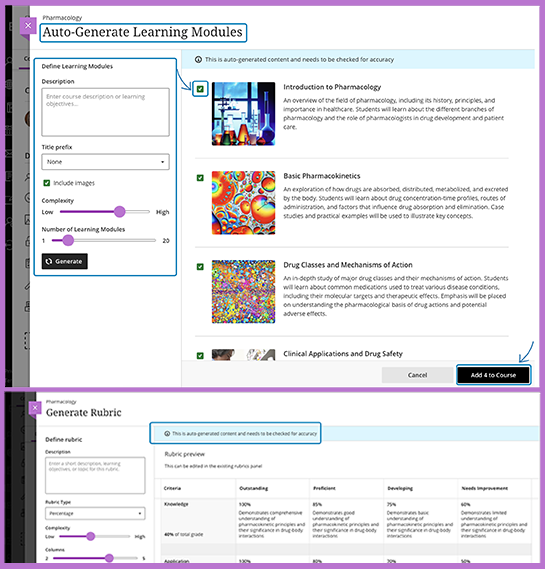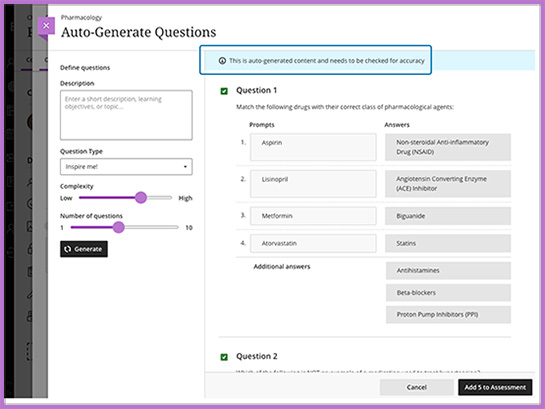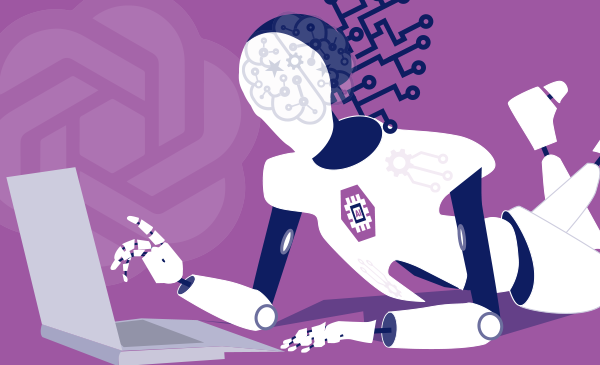Blackboard AI Design Assistant: Enhancing Course Creation and Learning Experience
quote
It is important to foster AI literacy among students, preparing them to engage with these cutting-edge tools effectively.
block 1

Artificial Intelligence (AI) is embedded in many areas of our lives, often significantly impacting our experiences. The use of AI in medicine, recently discussed at the UIC Leadership Retreat, shows great potential. When qualified professionals can critically evaluate AI tools’ output, work productivity, and engagement levels increase. Instructors are qualified professionals who approve the content in their courses, whether it comes from a textbook publisher, external website, or a student. For some instructors, using external AI tools for generating course content or finding course artwork has become a practice that can carry data privacy and liability risks. Instead, university-licensed AI tools that meet data privacy and security requirements protect instructors and abstract the complex text prompts into simple graphical interfaces that produce course elements without the need for copying and pasting.
Instructors often find themselves grappling with tight schedules, making the task of updating course materials within a limited timeframe challenging. Furthermore, the challenge is compounded when integrating cutting-edge tools like rubrics and formative quizzes. To address these issues, Blackboard Ultra introduces an innovative toolkit for instructors, offering pre-designed course components, resembling pedagogical building blocks. This expedites content creation, aligning with Mihaly Csikszentmihalyi’s concept of “flow” – an effortless progression through difficult tasks.
block 2

The new Blackboard AI Design Assistant is a powerful set of tools that aids instructors in creating and designing course content. Developed in partnership with Microsoft, it offers several Generative AI-facilitated functionalities in Blackboard Learn Ultra courses, including course image sourcing with Unsplash, assignment rubric suggestions, quiz question suggestions based on a document, and creation of learning modules based on a list such as textbook chapters covered in the course. UIC will be enabling the AI Design Assistant in the Blackboard environment on Friday, September 22, 2023, after business hours.
Rubric Generation
The AI Design Assistant can generate suggested grading rubrics based on an assignment and the instructor’s expectations: “A rubric is a multi-purpose scoring guide for assessing student products and performances. This tool works in a number of different ways to advance student learning and has great potential in particular for non-traditional, first generation, and minority students. In addition, rubrics improve teaching, contribute to sound assessment, and are an important source of information for program improvement” (Wolf & Stevens, 2007).
While beneficial to student success and useful to instructors for efficient grading, rubrics have been adopted slowly in Higher Education. Research acknowledges that “creating rubrics can be both time consuming and conceptually difficult” (Sanger & Gleason, 2020).
Generating comprehensive rubric drafts through the AI Design Assistant in Ultra courses can be a seamless endeavor. These drafts are generated using existing digital assignments within the course or by incorporating instructor-specific guidance. This streamlined approach not only minimizes frustration but also encourages the incorporation of well-established pedagogical techniques.
quote2
The new Blackboard AI Design Assistant is a powerful set of tools that aids instructors in creating and designing course content.
block 3

Quiz Question Generation
Crafting quiz questions, even for brief quizzes, often proves to be a daunting and laborious task. This sentiment is widely acknowledged within the academic community and is substantiated by existing literature. CH and Saha (2020) note that “manual generation of MCQs (multiple choice questions) is expensive and time-consuming.” Gamage et al. (2019) echoes the same thought: “Setting up multiple-choice questions was labour intensive and time-consuming.” Liebler (2003) expands on this idea noting that “by implementing the five-minute quiz one section at a time and keeping the process simple, the total cost of producing the quiz is about 2 hours per week: one-half hour three times a week to create the quizzes.”
However, the value of providing simple checkpoints as formative feedback to students cannot be understated. Relying heavily on summative assessments, such as final exams, can lead to frustration and undermine student success. In this context, the AI Design Assistant steps in as a valuable resource, offering suggestions for formative quiz questions. This tool not only saves instructors precious time but also promotes the implementation of low-stakes assessments. Instructors can further enhance the suggested questions by providing descriptions, aligning them with specific learning objectives, or tailoring them to pertinent topics. Additionally, the “Inspire me!” question type introduces a diverse range of question formats that instructors may not typically consider, thus fostering more varied and engaging assessment experiences for students.




